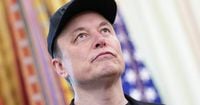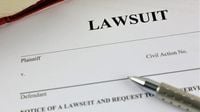Elon Musk, the world’s richest person and a perennial lightning rod for controversy, has once again found himself at the center of a high-stakes legal battle. On August 21, 2025, a federal judge in Austin, Texas, ordered Musk to face a lawsuit brought by voters who claim he defrauded them into signing a petition in exchange for a chance to win a $1 million-a-day cash prize. The lawsuit, filed by Arizona resident Jacqueline McAferty on Election Day, November 5, 2024, alleges that Musk and his political action committee, America PAC, misled thousands of voters across seven battleground states through what plaintiffs describe as a fraudulent campaign.
According to Reuters and multiple court filings, the heart of the case centers on Musk’s America PAC, which was launched to support Republican Donald Trump’s ultimately successful 2024 presidential run. The PAC promoted a petition campaign pledging support for the U.S. Constitution—specifically the First and Second Amendments, which protect free speech and the right to bear arms. But the real draw was the promise that every day, from the campaign’s announcement until Election Day, one lucky signer in a swing state would be randomly selected to receive a $1 million prize.
The campaign was rolled out with considerable fanfare. At a Pennsylvania town hall on October 19, 2024, Musk electrified the crowd, declaring, “I have a surprise for you, which is that we’re going to be awarding one million dollars, randomly, to people who have signed the petition. Every day from now until the election.” He amplified the message on X (formerly Twitter), posting: “Every day, from now through Nov 5, @America PAC will be giving away $1M to someone in swing states who signed our petition to support free speech & the right to bear arms! We want to make sure that everyone in swing states hears about this and I suspect this will ensure they do.”
But as the campaign unfolded, cracks began to show. According to the Washington Post and court documents, the winners of the $1 million prize were not randomly selected as promised. Instead, they were hand-picked by America PAC staff, with personal stories playing a significant role in the selection process. Winners were required to sign contracts to serve as spokespeople for the PAC, rather than simply being chosen by chance. This revelation, made public during an unsuccessful legal challenge in Philadelphia, fueled allegations that the entire operation was a deceptive scheme designed to harvest valuable personal information from voters.
Those who signed the petition were required to provide names, addresses, email addresses, and phone numbers—data that, as Judge Robert Pitman noted, could be highly valuable in the context of political campaigning. The lawsuit alleges that voters had no real chance to collect the promised prize and that the campaign was less a lottery and more a sophisticated data-gathering operation under the guise of a sweepstakes.
McAferty, the lead plaintiff, claims she never would have signed or provided her personal information had she known the selection process was not random. In her complaint, she states that Musk and America PAC “induced voters with false statements to sign the petition and submit personal, private information in the process.” She further alleges that “had she been aware that she had no chance of receiving $1 million, she would not have signed or supported the petition and would not have provided her [personal information] to Defendants.”
Musk’s legal team pushed back forcefully, seeking to dismiss the case on the grounds that signers suffered no tangible harm by sharing their details and that the terms of the giveaway were not misrepresented. In their motion, Musk’s lawyers pointed to several “red flags” they said should have made clear to participants that the contest was not a traditional lottery. However, Judge Pitman was unconvinced, writing in his ruling, “It is plausible that plaintiff justifiably relied on those statements to believe that defendants were objectively offering her the chance to enter a random lottery—even if that is not what they subjectively intended to do.”
The judge also left open the possibility that an expert in political data brokerage could testify about the value of the personal information collected from voters in battleground states. This could be a crucial point as the case moves forward, given the increasing role of data-driven strategies in modern political campaigns.
The legal saga is just the latest in a string of lawsuits and controversies stemming from the America PAC campaign. Prior to the Texas case, similar legal challenges were filed in Michigan, Pennsylvania, and Wisconsin, with varying results. A Michigan fraud class action was tossed by a judge, and a Philadelphia lawsuit alleging the giveaway was an illegal lottery was dismissed after the city’s top prosecutor failed to prove it. However, several cases remain pending, including a Pennsylvania class action alleging unpaid petitioners and a Wisconsin lawsuit alleging voter bribery.
The campaign itself was highly targeted, running exclusively in the swing states of Pennsylvania, Georgia, Nevada, Arizona, Michigan, Wisconsin, and North Carolina. Trump ultimately won all seven states before a dramatic public falling out with Musk over a controversial tax and spending bill—dubbed the “Big Beautiful Bill”—which Musk called a “disgusting abomination.” The bill, which included an amendment allowing gamblers to deduct 90% of their losses from winnings before paying tax, sparked its own firestorm. Former Vice President Mike Pence led a group supporting the tax provision, while bills seeking to reverse the measure were introduced in both the House and Senate.
Beyond the legal wrangling, the Musk lawsuit raises broader questions about the use of social media and digital platforms in political fundraising and outreach. As reported by the Washington Post, the case highlights how opaque and potentially deceptive tactics can be used to influence public opinion during critical electoral moments, with little accountability for those who orchestrate such campaigns.
For Musk, whose influence in the political sphere has waxed and waned in recent months, the lawsuit is a fresh reminder of the scrutiny that comes with playing at the intersection of technology, politics, and personal fortune. His America PAC funneled millions into Trump’s campaign and was at the forefront of efforts to reshape the federal government—until Musk and Trump’s relationship soured. Despite reports that Musk has abandoned plans to start his own political party, he has publicly denied giving up on the idea.
As the case proceeds in Texas, both sides are gearing up for what could be a precedent-setting battle over the boundaries of political persuasion, data privacy, and the responsibilities of those who wield enormous influence in the digital age. The outcome could reverberate far beyond Musk himself, shaping how future campaigns interact with voters—and what promises, if any, can be trusted.


